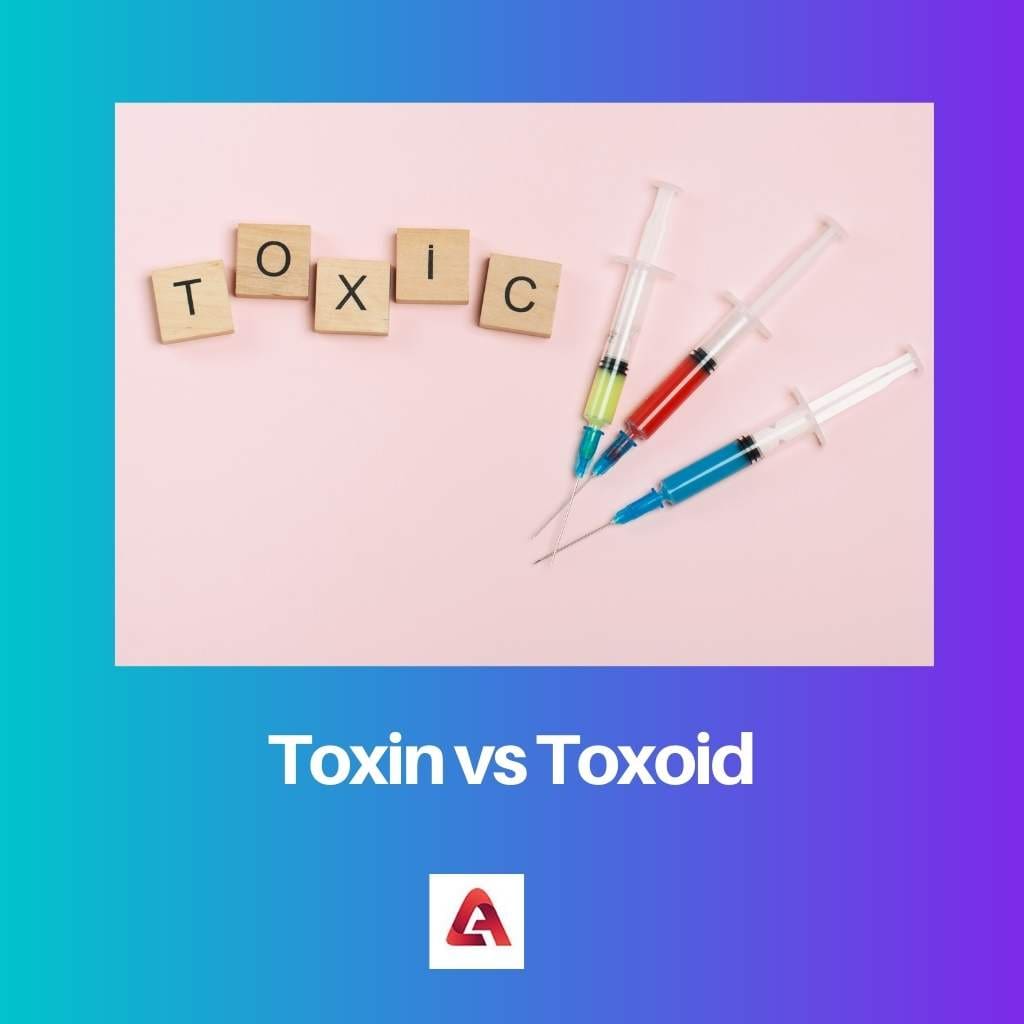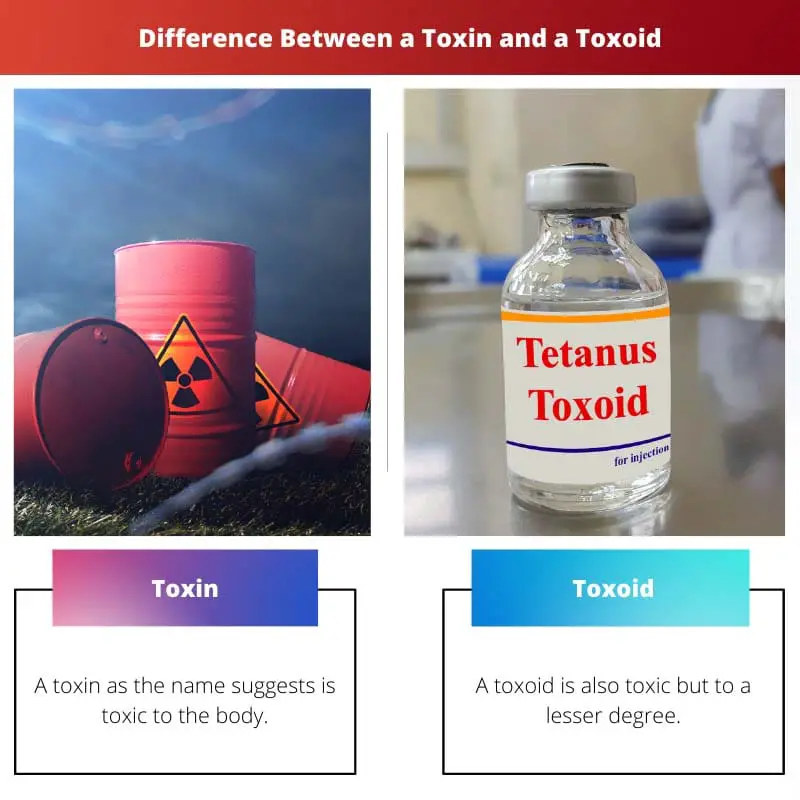A toxin and a toxoid can be very easily mistaken for each other if looked at structurally as they resemble each other, but in reality, a toxin and a toxoid have completely different effects on the body of an individual.
Both terms can be distinguished if the virulence is taken into consideration.
Key Takeaways
- Toxins are harmful substances produced by organisms, such as bacteria, that can cause disease or damage.
- Toxoids are inactivated or weakened toxins used in vaccines to stimulate an immune response without causing harm.
- Vaccines containing toxoids help the body develop immunity to specific toxins, protecting against future exposure.
Toxin vs Toxoid
The difference between a toxin and a toxoid is that they differ in their general effect on the body. A toxin is toxic. It is harmful to the body or its functions. A toxoid, on the other hand, is not toxic, instead, it initiates an immunological protective response against a toxin.

A toxin can be any substance that harms you or the environment. They can come in the form of chemicals or biological matter. In the human body, a toxin can be anything that causes your cells to malfunction or die.
In small amounts, they can cause sickness, in larger amounts, they can cause death.
A toxoid is a toxin that has been modified to produce immunity against specific diseases without causing illness. It is derived from a toxin however does not have any harmful effect like that of a toxin instead helps to provide immunity against a toxin.
Comparison Table
| Parameters of Comparison | A toxin | A toxoid |
|---|---|---|
| Toxicity | A toxin as the name suggests is toxic to the body. | A toxoid is also toxic but to a lesser degree. |
| Synthesis | A toxin is naturally produced by living organisms. | A toxoid is an artificially attenuated toxin. |
| Virulence | A toxin is harmful to the human body. | A toxoid has no virulence as it has been attenuated. |
| Immunogenicity | A toxin does not build immunity in the body. | A toxoid helps to build immunity against a toxin. |
| Administration | A toxin is never administered deliberately as it causes a harmful reaction. | A toxoid is administered to patients as a vaccine to initiate an immune response. |
What is a Toxin?
A toxin is a poison or a harmful substance that can harm the body if consumed in large doses. There is also a special class of toxins known as biological toxins, which are produced by living cells or organisms.
Toxins, however can be of other types like chemical toxins, air toxins, and so on. Chemically they are polysaccharides or polypeptides.
A toxin is a poisonous substance produced naturally by the body to defend against foreign invaders like mould, bacteria, fungi, and viruses. A toxin useful in a particular organism can also harm another.
The most famous toxin producers are bacteria and viruses that produce toxins that cause diseases in humans.
Toxins are found in our environment and include the ability to: make you sick, cause an inflammatory reaction, may or may not be radioactive, also may be carcinogenic.
The toxins’ source can vary, ranging from food, daily used surfaces, chemicals, and animals to even contaminated air or water.
Toxins can also be of various types. Mainly toxins are classified as endotoxins and exotoxins. Endotoxins are toxins produced by organisms inside their cell walls, and they are released only on the lysis of the cell.
Exotoxins, on the other hand, are released externally by the producer cell.

What is a Toxoid?
A toxoid is a non-toxic substance that resembles a toxin in its ability to stimulate the production of antibodies. For example, the toxoid in the tetanus vaccine contains a protein that mimics the harmful effects of the tetanus toxin but is not a toxin.
Toxoids are used as they trick the body into producing antibodies against harmful toxins and chemicals and also create a memory of these toxins such that when and if exposed to the toxin, the body can effectively fight against it.
This phenomenon is also called the secondary immune response.
Toxoids are thus similar to toxins in structure but differ in their disease-causing capacity or virulence. They are completely safe and thus are administered as a cure rather than a danger.
Toxoids are used in vaccines like tetanus, cholera, diphtheria, and so on.
Toxoids are thus altered synthetically to resemble but not be similar to a toxin such that they may be recognized by the body as a threat and cause an immunogenic reaction, but they will not harm the body to the extent of a toxin, and hence it is much safer to be administered to build immunity of the recipient.
Main Differences Between a Toxin and a Toxoid
- A toxin is a naturally produced chemical, while a toxoid is an artificially synthesized chemical.
- A toxin does help to create immunity, while a toxoid helps to create immunity against the toxin it is derived from.
- Toxins are not used in their original form in vaccines, while toxoids are the basic component of a vaccine.
- Toxins are found naturally from varied sources, while toxoids are found only in laboratories and medicines that they produced from these laboratories, as toxoids are not naturally found.
- Toxins possess the capability of producing an immunogenic response that is not controllable and favourable for the body, while toxoids produce an immunogenic response that is favourable and uncontrollable.

References
- https://www.annualreviews.org/doi/pdf/10.1146/annurev.bi.46.070177.000441
- https://www.ncbi.nlm.nih.gov/pmc/articles/pmc2047731/
- https://www.sciencedirect.com/science/article/pii/S0891584920312168

A well-researched and informative article. It explains the concept of toxins and toxoids clearly.
This is an important article. Glad to have this information handy.
Yes, I agree. It helps to clear the confusion and understand the distinction.
Very educative, indeed!
This article is a great source of knowledge and busts many misconceptions about toxins and toxoids.
Very interesting and enlightening article. It is pertinent to know the difference between the two as they have different effects on the body. Toxoid play a vital role in the immunity development in vaccines.
Yes, I totally agree that it is an interesting topic with the potential to save a lot of lives.
This article makes an important contribution to our understanding of toxins and toxoids. It is crucial to have this knowledge, especially in the field of medicine and vaccination.
The comparison table really helped in understanding the differences between a toxin and a toxoid.